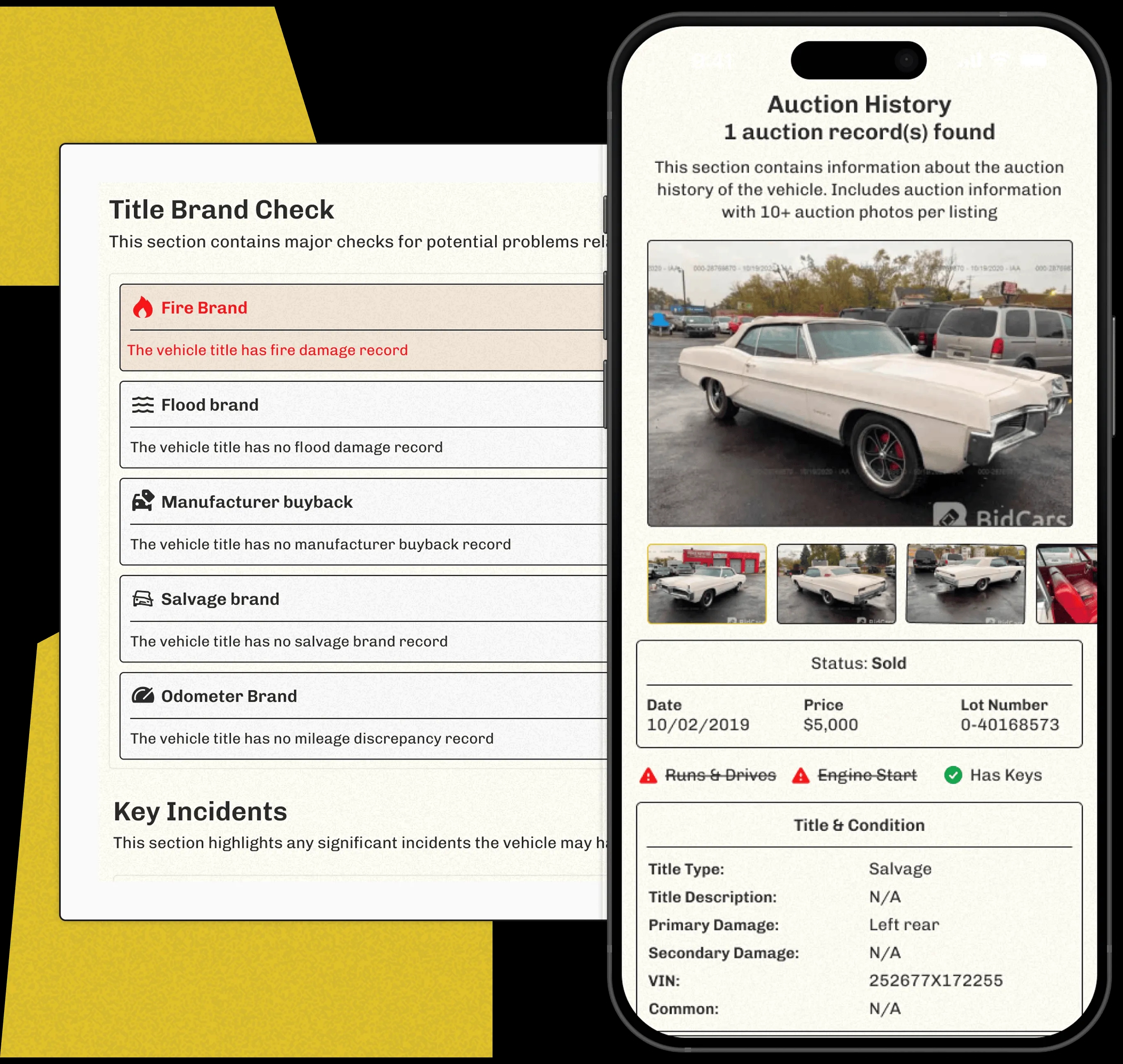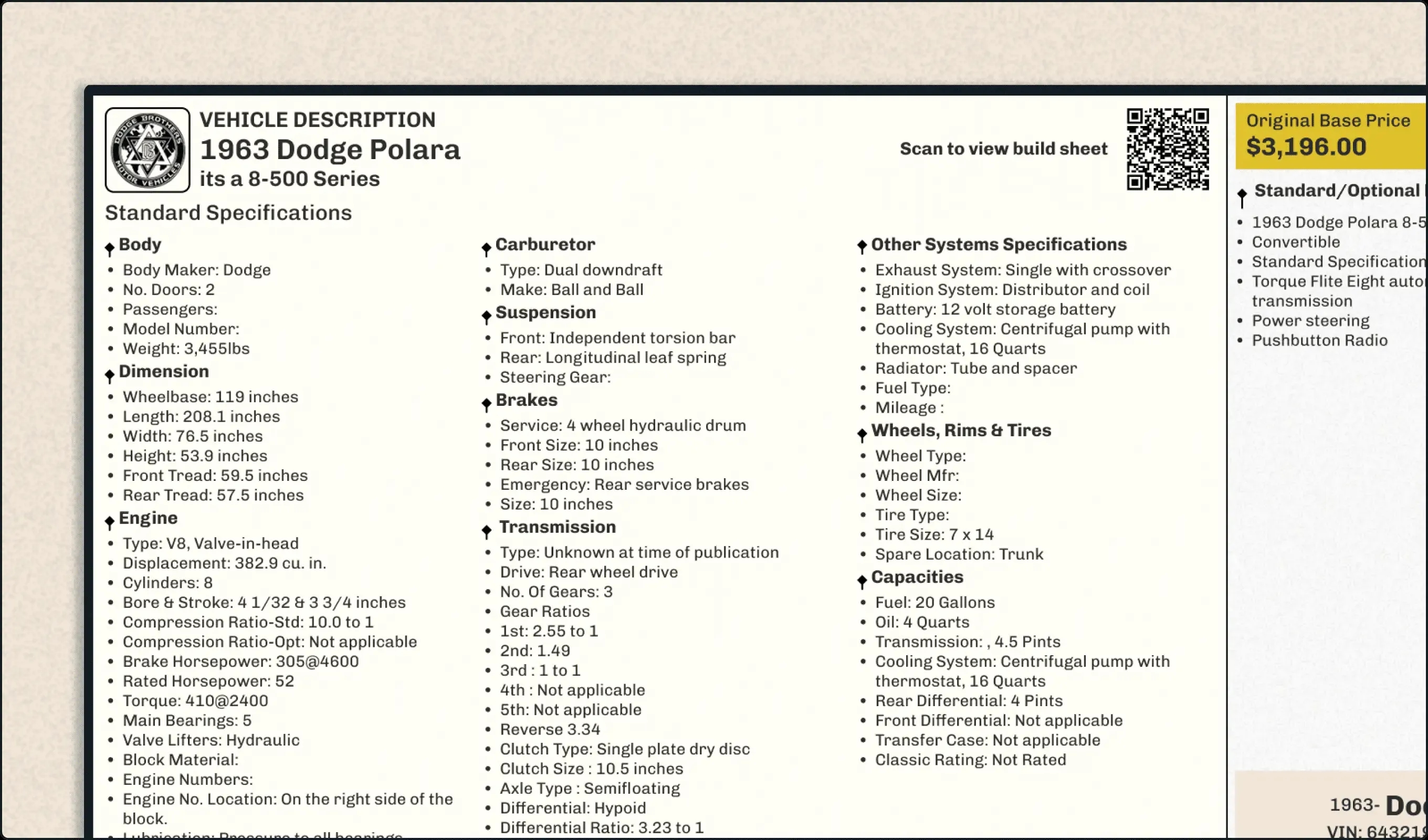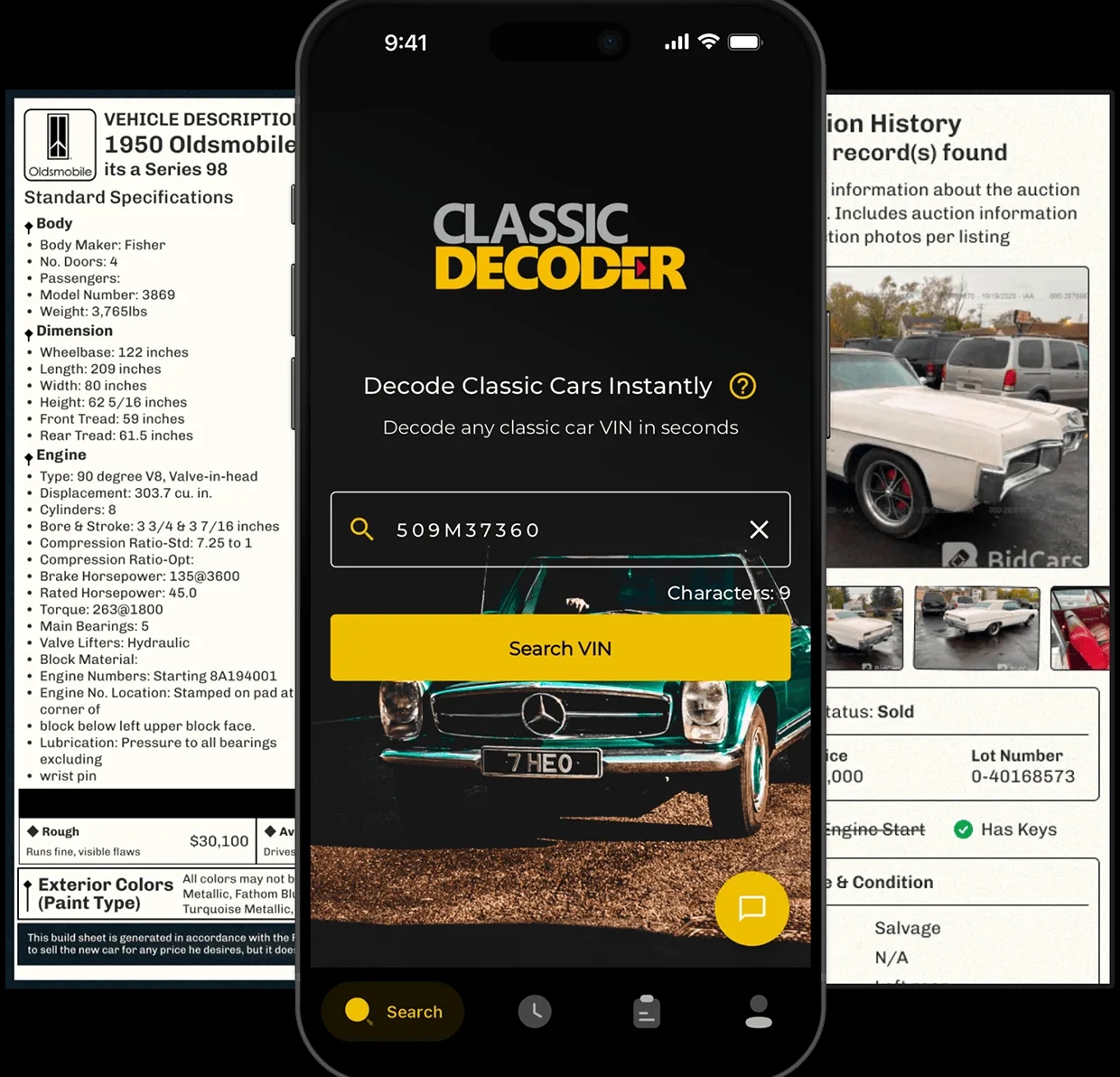1970 Lincoln Continental
The 1970 Lincoln Continental: A big, luxurious land yacht! Think classic American style at its peak. Its boxy shape and suicide doors were iconic, embodying 70s opulence. A symbol of success, it featured in movies & TV, cementing its place in pop culture history. Pure, unadulterated cool.
Decode Classic VINs to Get Vehicle History Report and Build Sheet
The 1970 Lincoln Continental: A Classic Luxury Icon
Imagine cruising down the boulevard in a car that turns heads with its imposing grille and luxurious presence. That's the 1970 Lincoln Continental for you—a true embodiment of American luxury during a time of cultural and economic contemplation. Often compared to other luxury titans like the Cadillac Eldorado, the Continental prided itself on comfort over speed, with a top speed that highlights a preference for a smooth, laid-back ride rather than blistering acceleration.

1970 Lincoln Continental Models:
Select the vehicle's model to see the correct data for it.
How Much is Lincoln Continental Worth?
Original MSRP :$5,585.00
Outstanding
Clean
Average
Rough
1970 Lincoln Continental Specs
Interested in buying a classic car or selling one?
Access detailed history reports for classic vehicles from hundreds of manufacturers.
- Accident Records
- Theft Records
- Loan & Lien Information
- Auction Information
- Salvage Information and more

History of the 1970 Lincoln Continental
The Lincoln Continental emerged during the 1960s, a time of significant change in automotive aesthetics, drawing inspiration from high-end icons such as Rolls-Royce. The model became a beacon of comfort and opulence, especially as the cultural optimism of the 60s shifted to a more uncertain future in the 70s.
Development and Design
L. David Ash and his team crafted the Continental, echoing the refined elegance of its predecessor, the Continental Mark II, while suiting the evolving tastes of the personal luxury market. Its design included a unique upright grille and a distinctive rear deck, reflecting a blend of classic style and modern luxury.
Learn more about a classic car: Get Build Sheet by VIN.
Access reproduced classic build sheets to learn more about your classic vehicle details.
- Standard Specifications
- Original Base Price
- Standard & Optional Equipment
- Exterior & Interior Colors
- VIN ID & Location description

Pop Culture and the 1970 Lincoln Continental
The car holds a special place in pop culture, often appearing in films and TV shows as a symbol of status and sophistication. This legacy is cemented by its association with superstars of its time, adding a layer of movie-star glamour to its classic allure.
Famous Figures Who Own a Lincoln Continental
You don't have to take a time machine back to the 70s to feel the allure. Simply look at the famous faces who fell head over heels for this car.
Elvis Presley
The King of Rock and Roll drove one of these beauties, and it wasn't just about the car's plush ride. For Elvis, the Continental was an extension of his bling-laden persona, bridging his love for style with his need for the best in comfort.
James Brown
The "Godfather of Soul" also had a soft spot for the Continental. For someone renowned for flamboyant performances, sitting behind its wheel seemed like the perfect harmony of energy and elegance.
Arnold Palmer
Even sports greats couldn't resist its charm. The legendary golfer Arnold Palmer joined the ranks of celebrity owners, demonstrating that the car's appeal transcended the glitz of Hollywood and touched the world of sports.
Jackie Gleason
Known for his extravagant tastes, this renowned comedian used a 1978 Lincoln Continental Limousine as his personal vehicle. Its luxurious features, such as the plush red velvet seats, perfectly matched Gleason's larger-than-life personality.
Performance and Market Position
Sure, it wasn't the fastest car on the block, but the Continental bragged different—it personified comfort, thanks to its cushy ride and quiet demeanor. And in terms of market desirability? Well, it has held its value remarkably well over the years, with sales prices today reflecting its status as a collector's gem.

How Can I Check a Classic Car's History?
If you're in the market or just curious about the lineage of a classic car you fancy, several tools can help make informed decisions. Consider using a to unravel the history encoded within those seemingly random digits.
Interested in Buying or Selling a Classic Car?
Understanding the history and configuration, like the classic , is crucial. An in-depth , which typically covers:
- Accident Records
- Theft Records
- Loan & Lien Information
- Auction Information
- Salvage Information and more
Performing a or specialized checks like a , help piece the car's past together. Whether you're dealing with keen collectors or connoisseurs, having these details can be a game-changer!
Now, ready to unearth the whispers of your vintage's past?
Classic VIN Decoder App |Now available on both Android and iOS!
At Classic Decoder, we believe that developing a mobile app is a great way to extend our classic car data solution hub to as many users as possible across the globe. Our app is built with users and precision in mind. It holds the key to unlocking the history and details of any retro car at your fingertips. It also comes with fascinating and user-friendly features that make it stand out from other mobile apps designed for this purpose.
The Classic Decoder app lets you decode and lookup any classic VIN in a flash. Access accurate vehicle information and history, make an informed decision faster, and buy and trade in classic cars with confidence.

Download The Classic Decoder App now.
Some unique features include:
- Support all classic VIN lengths from 5 to 13 digits
- Support classic cars produced from 1910 – 1980
- Online Garage features – to add and manage your vehicles
- 24/7 Customer Support
- Easy onboarding for first-time users
Explore Lincoln Continental from Other Years
Frequently Asked Questions
Well, the 1970 Lincoln Continental? A real head-turner, that one! You'll instantly recognize its boxy, almost imposing profile; it's a real statement piece. Think of it like a really, really luxurious brick—a very stylish brick, of course. Key features include the iconic suicide doors (that's what the cool kids call them!), the massive grille, and the overall feeling of sheer size and opulence. Seriously, it's huge! Inside, you're treated to plush seating, loads of chrome, and enough wood paneling to make a tree weep. Oh, and don't forget about the massive, comfortable ride; it's like floating on a cloud—a very, very heavy, luxurious cloud.
The 1970 Continental wasn't exactly known for its 'zippy' acceleration, if you catch my drift. It came standard with a hefty 462 cubic inch V8—a real beast— churning out respectable horsepower, if not exactly what you'd call 'sporty'. Think of it as a powerful workhorse more than a racehorse. There was also a slightly more powerful 462 available later in the year, but honestly, the difference was probably negligible for most owners. They weren't really about speed, you see; they were all about comfortable cruising, those Continental owners.
Primarily, you're looking at two main body styles for the 1970 Lincoln Continental: the four-door sedan and the two-door convertible. The convertible, naturally, is far rarer, and therefore tends to command higher prices. Think of it like finding a four-leaf clover versus a regular one – considerably rarer, you see! Now both styles were massive, luxurious, and equally impressive in their presence. Honestly, whichever you choose, you'll turn some heads.
Ah, reliability. That's a whole other ballgame, isn't it? Let's just say that parts can be a bit more challenging to source than for, say, a Honda Civic. These weren't exactly built for bulletproof reliability; they were built for comfort and style. That being said, with proper care and maintenance, which, I might add, these cars need a fair amount of, they can be surprisingly dependable. It's like an old friend, you know? A bit temperamental sometimes, but ultimately loyal, if you treat them right.
Pricing varies wildly depending on condition, options, and—this is crucial—how well it's been maintained. A pristine, concours-ready example will fetch a hefty sum, let me tell you. On the other hand, a project car, that's a different story. You'll find a larger range of prices; think of it like buying a house: the price depends significantly on its state. To give you some idea, though, be prepared for a significant investment. You won't be finding these at bargain-basement prices, that's for sure.
Finding parts for a classic car like this can sometimes feel like an archaeological dig, but there are resources! Online classic car parts suppliers are your best bet, although you might have to do a little hunting. Local classic car clubs and forums can also be a great resource. Folks there often know the ins and outs, and might even know where to find some obscure parts. It can be like following a treasure map sometimes, but the search is often half the fun.

